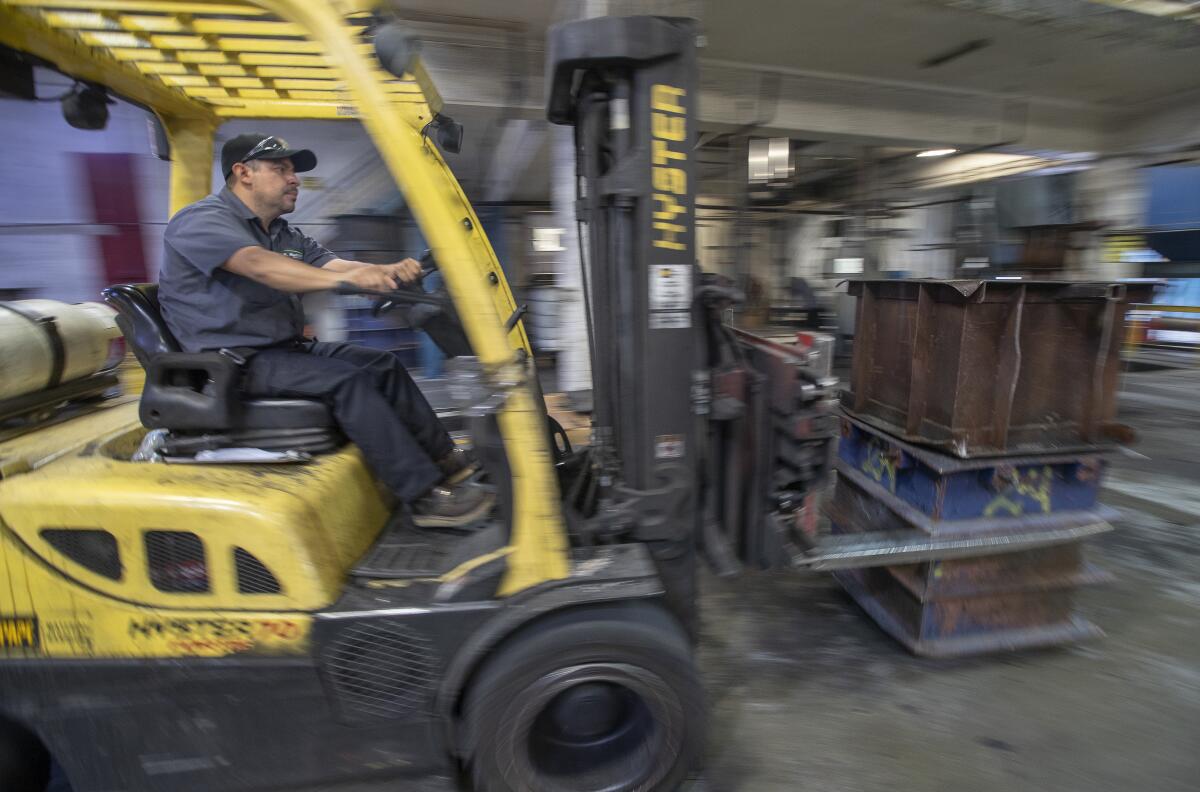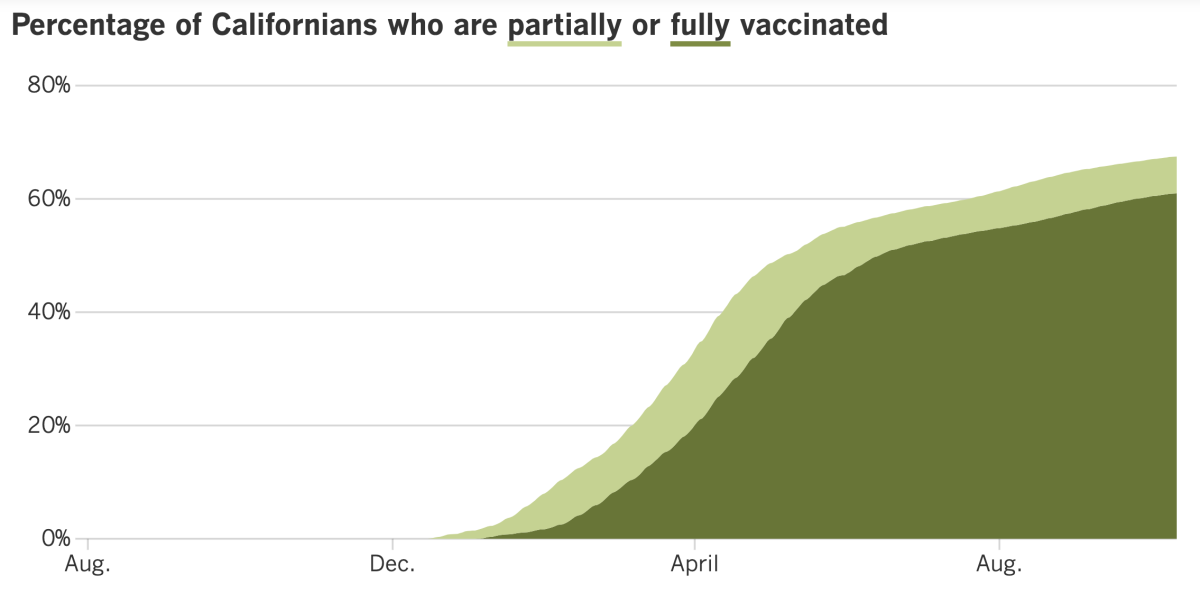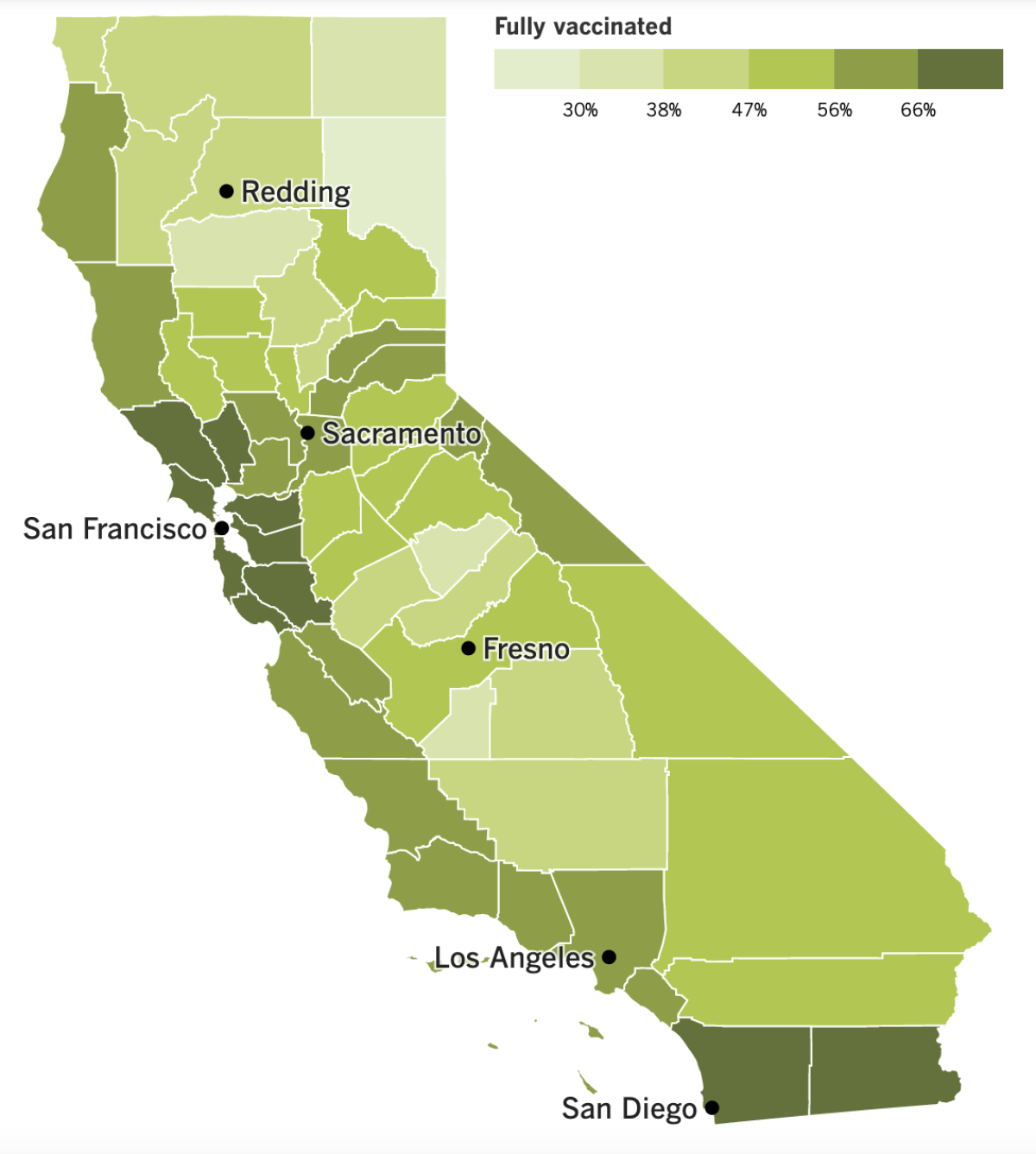Coronavirus Today: Finding opportunity in the pandemic
- Share via
Good evening. I’m Karen Kaplan, and it’s Tuesday, Oct. 13. Here’s the latest on what’s happening with the coronavirus in California and beyond.
Think back to the earliest days of the pandemic, when there was hardly a roll of toilet paper to be found. If you had been under the impression that COVID-19 was simply a bad flu, the sudden disappearance of bathroom tissue would have clued you in that we were well beyond the realm of a normal disease outbreak. (You might even say that it’s when, uh, stuff got real.)
While you were worrying about how you’d get along without your Charmin or Cottonelle, Oliver Elsoud was worrying about how his German startup company was going to keep up with a sudden spike in sales.
Elsoud’s product was called Happy Po, which translates to something close to “Happy Rear End.” It’s an 11-inch-tall squeeze bottle that allows you to aim a stream of water at your backside, making toilet paper unnecessary. The 37-year-old dreamed up the product after taking business trips to Asia and the Middle East, where he became a fan of bidets. But despite an appearance on Germany’s version of “Shark Tank,” Elsoud and his partner were struggling to break their countrymen of their toilet paper habit.
It turns out Elsoud didn’t need a slot on a reality TV show to succeed. He needed the coronavirus. Within a few weeks, demand for his product multiplied by a factor of 10.
“The coronavirus took us to the next level,” he told my colleagues Erik Kirschbaum and Victoria Kim. “Corona changed everything for us.”
We’re so used to thinking about the pandemic as an unmitigated disaster, but there are folks like Elsoud who have come out ahead. Those people were generally from countries that had the most advantages to start with.
Kim and Kirschbaum liken the situation to what we’re seeing with COVID-19 vaccines, as rich countries like the U.S. administer booster shots to people who’ve been fully vaccinated for months while poor countries struggle to get even a first dose into citizens’ arms.
“Wealth and opportunity have never more clearly seemed a matter of geographic lottery,” they write.
That’s because the ingredients needed to take advantage of this pandemic opportunity are more readily available in high-income countries.
As a result, the geographically fortunate have widened the inequality gap. The latest Global Wealth Report from the Credit Suisse Research Institute says that in 2020, household wealth per adult fell 11.4% in Latin America and 2.1% in Africa. At the same time, it increased 9.1% in North America and 9.8% in Europe.
Jung Gyu-ho, a 23-year-old college student in South Korea, has seen his net worth balloon by about 50%, he estimates.
In part, that’s because he was nimble enough to set up an e-commerce site for selling face masks when everyone suddenly wanted as many as they could get. And, in part, it’s because he had spent some years working at a semiconductor factory and had put his earnings into real estate and the stock market — two investments that appreciated handsomely.
Jung couldn’t have had this financial success without hard work. But he recognized that being in a country like South Korea improved the odds that his hard work would pay off.
“The gulf is incredibly wide,” he said.
Elsoud also got a big pandemic payout. In February, he sold the company behind Happy Po for a sum he described as “several million euros.”
“Things certainly went our way,” he said. “We were lucky.”
By the numbers
California cases and deaths as of 4:02 p.m. Tuesday:

Track California’s coronavirus spread and vaccination efforts — including the latest numbers and how they break down — with our graphics.
A fresh start for felons
Here’s another story of economic opportunity in the midst of the pandemic, and it has a happy ending for people who don’t usually get one: former felons.
In normal times, Americans with criminal records struggle to find gainful employment. But these are not normal times. The economy is rebounding, though without the millions of baby boomers who either lost their jobs or left them voluntarily after the disruption of the pandemic. Faced with an unprecedented labor shortage, employers are casting a wider net.
That net caught Thomas Urioste, a man who served nearly 10 years in federal prison. He was living in a halfway house and struggling to find a job when he applied for a position at U.S. Rubber Recycling in Colton. The company was desperate for workers to help it turn old tires into rubber mats and flooring for personal gyms, and Urioste was hired.
In the six months since, he has seen both his responsibilities and his pay increase.
“They took a chance on me,” the 50-year-old Wrightwood man said. “It feels pretty good because they trusted me.”
U.S. Rubber is unusual because it’s been giving people like Urioste second chances for years. It’s been offering more of them lately to keep up with demand from people who used to frequent fitness centers and decided to set up home gyms to get them through the pandemic.

With a record 10.4 million jobs to fill this summer, a growing number of companies are now following U.S. Rubber’s lead, my colleague Don Lee reports. The number of inquiries coming into Chrysalis, a nonprofit in Los Angeles that helps people who are unhoused and unemployed, has almost tripled this year. Honest Jobs, a firm in Ohio that helps steer former felons into jobs, said seven Fortune 500 companies had become partners in the last few months.
Economists estimate there are about 20 million Americans — most of them men — who have been convicted of felonies. Companies that need workers tend to see them as a last resort.
“Of all people who face challenges in the labor market, those with records are at the end of the queue,” said Shawn Bushway, an economist based in Albany, N.Y., and criminologist at Rand Corp.
Usually, it takes an exceedingly low unemployment rate to make companies give serious consideration to workers with records. But the jobless rate is hardly at rock bottom. On Friday, the U.S. Department of Labor announced that the nation’s unemployment in September was 4.8%.
Also, opportunities for ex-offenders tend to be short-lived, but some analysts think that might not be the case in the post-pandemic economy. Employers are coming to recognize that the longer a formerly incarcerated person maintains a clean record, the more likely they are to remain clean. After five to 10 years, the odds of criminal activity are the same as for anyone else.
Jeff Baldassari, the chief executive of U.S. Rubber Recycling, says trusting former felons to work as hard as other employees has been good for his business. And for the workers themselves, it’s even better.
Baldassari hired Carlos Arceo despite the fact that he served 10 years in an Arizona prison. Arceo has been promoted four times over the last two years, and he became a shift supervisor when the pandemic prompted the company to step up its production.
Arceo, 39, observes that the company recycles more than used tires: “We’re giving people a second chance too.”
California’s vaccination progress


See the latest on California’s vaccination progress with our tracker.
Your support helps us deliver the news that matters most.
In other news ...
The Los Angeles Unified School District has given teachers and other workers an additional month to get vaccinated against COVID-19 or risk losing their jobs — a sign that a substantial number of district employees are still resistant to the shots.
The original deadline for receiving a second shot of the Pfizer-BioNTech or Moderna vaccine had been this Friday, Oct. 15. Now a second dose — which comes three or four weeks after the first — can be received as late as Nov. 15. (The extension did not clearly address the Johnson & Johnson vaccine; since that requires only a single dose, it’s still possible to get it and be done by the initial deadline.)
It’s not clear how many LAUSD staffers remain unvaccinated. As of Sept. 27, about 20% of them had yet to provide documentation showing they’d received the shots. That could work out to 10,000 people or more.
Considering that the district is already struggling to fill more than 2,000 jobs for teachers, counselors, nurses and other staff, interim Supt. Megan Reilly doesn’t seem eager to fire thousands of workers for violating a vaccine mandate.
“We don’t want people to be out of jobs,” Reilly said. But at the same time, “we’re absolutely adamant about keeping our schools the safest possible environment — and vaccinations are clearly the pathway to keeping them safe.”
While Reilly is giving people more time to get comfortable with the idea of the shots — or perhaps to seek a medical or religious exemption — it doesn’t sound like she plans to weaken the vaccine mandate: “People have to be vaccinated or they’re not going to be part of the district.”
If those holdouts ultimately decide to visit a vaccination clinic, they won’t have to worry about being harassed by protesters on their way in. They can thank state Sen. Richard Pan (D-Sacramento) for introducing SB 742, the measure that makes it a misdemeanor to harass, intimidate, injure or obstruct someone on their way to get a vaccine for COVID-19 or anything else. And they can thank Gov. Gavin Newsom for signing the measure into law on Friday.
The state law carries a maximum punishment of up to six months in jail and/or a fine of up to $1,000. It went into effect immediately.
Catherine Flores Martin, executive director of the pro-vaccine California Immunization Coalition, says the law will be particularly helpful for parents bringing their children in for COVID-19 shots. Adolescents as young as 12 are currently eligible for the Pfizer-BioNTech vaccine, and a version could be authorized for children as young as 5 in a matter of weeks.
“Our biggest concern is when children are getting vaccinated,” Flores Martin said. “Some of these people feel like they need to protest, and that’s scary and extremely inappropriate.”
Some experts are still concerned that the law criminalizes speech that’s protected by the 1st Amendment, even after the language was tweaked to take that objection into account. Ultimately, the courts may decide the law’s fate.
Community clinics in California have something else to worry about in the meantime: They haven’t been paid for administering at least 1 million doses of COVID-19 vaccine since January. The missing cash adds up to tens of millions of dollars or more.
The problem stems from the complicated way certain health centers get reimbursed by Medi-Cal, particularly when a COVID-19 vaccination is the only service provided. Some clinics say the red tape is so much trouble, they’re not even bothering to seek payment.
But in other cases, clinics have had trouble retaining staff without getting paid for the shots they’ve delivered. Clinics in other states, including Michigan and Mississippi, are also awaiting payment.
In Texas, Gov. Greg Abbott has found a new way to slow vaccination rates. On Monday, he issued an executive order that blocks private businesses and other entities from enforcing COVID-19 vaccine mandates on workers.
“No entity in Texas can compel receipt of a COVID-19 vaccine by any individual, including an employee or a consumer, who objects to such vaccination for any reason of personal conscience, based on a religious belief, or for medical reasons, including prior recovery from COVID-19,” Abbott’s order states.
That will set up a showdown of sorts once the Biden administration issues rules requiring companies with more than 100 employees to be sure those workers are vaccinated or else test them weekly. Dallas-based Southwest Airlines and American Airlines of Fort Worth are among the Texas companies that have said they’d comply with the federal mandate.
Abbott, who is seeking a third term as governor, has been under attack from two Republicans running against him in next year’s primary. Both rivals are strongly opposed to vaccine mandates.
And from the Department of 20-20 Hindsight: A comprehensive report by British lawmakers of their government’s pandemic response has concluded that the country’s failure to impose a lockdown in the early days of the outbreak resulted in thousands of preventable deaths.
Although countries in Asia were taking aggressive action to limit coronavirus spread, Prime Minister Boris Johnson failed to challenge his scientific advisors who said such action wasn’t necessary. That view changed only after Britain’s National Health Service was at risk of being overwhelmed with COVID-19 patients, the report said. A lockdown was ordered in late March of 2020.
“Decisions on lockdowns and social distancing during the early weeks of the pandemic — and the advice that led to them — rank as one of the most important public health failures the United Kingdom has ever experienced,” the joint report from the House of Commons’ science and health committees said.
Even now, Britain’s COVID-19 death toll is higher than that of any other country in Europe, except for Russia.
Your questions answered
Today’s question comes from readers who want to know: Is it safe to go trick-or-treating this year?
Health officials say the answer is yes, though they suggest some modifications to your Halloween festivities to increase your odds of getting a treat instead of a trick.
First on the list is to get vaccinated (if you haven’t done so already).
“The best thing all of us can do to get ready for the holidays is to get vaccinated as soon as possible if we’re eligible,” said L.A. County Public Health Director Barbara Ferrer.
Dr. Anthony Fauci gave the same advice, saying the shots would offer an “extra degree of protection.”
The second thing to keep in mind is that outdoor activities are safer than indoor ones. That means a trip to the pumpkin patch, a hayride or a backyard screening of a scary movie are all safer than visiting a haunted house or hanging out in someone’s living room.
Though trick-or-treating already takes place outdoors, you can make it safer by limiting the size of your door-knocking group, the American Academy of Pediatrics advises.
Households doling out candy can set up grab-and-go stations of individually packaged items to reduce congestion at front doors and to facilitate social distancing among trick-or-treaters — especially those under 12 who are still too young to get vaccinated (at least for now).
Those who’ll be doling out treats from their front doors can use chalk or tape to mark out places for costumed kids to stand six feet apart while they’re waiting for their turn. Instead of passing a treat from hand to hand, you can deliver it from a distance by sliding it through a wrapping paper tube.
Third, it’s best to wear face masks if you’re in a crowded situation. The mask that’s part of a Halloween costume doesn’t count.
“Masks should cover the mouth and nose and fit snugly against the sides of the face without gaps,” the pediatrician group reminds us.
Finally, everyone involved in the festivities should wash or sanitize their hands regularly.
For more detailed guidance, check out these tips from the L.A. County Department of Public Health.
We want to hear from you. Email us your coronavirus questions, and we’ll do our best to answer them. Wondering if your question’s already been answered? Check out our archive here.
Resources
Need a vaccine? Keep in mind that supplies are limited, and getting one can be a challenge. Sign up for email updates, check your eligibility and, if you’re eligible, make an appointment where you live: City of Los Angeles | Los Angeles County | Kern County | Orange County | Riverside County | San Bernardino County | San Diego County | San Luis Obispo County | Santa Barbara County | Ventura County
Practice social distancing using these tips, and wear a mask or two.
Watch for symptoms such as fever, cough, shortness of breath, chills, shaking with chills, muscle pain, headache, sore throat and loss of taste or smell. Here’s what to look for and when.
Need to get tested? Here’s where you can in L.A. County and around California.
Americans are hurting in many ways. We have advice for helping kids cope, resources for people experiencing domestic abuse and a newsletter to help you make ends meet.
We’ve answered hundreds of readers’ questions. Explore them in our archive here.
For our most up-to-date coverage, visit our homepage and our Health section, get our breaking news alerts, and follow us on Twitter and Instagram.




